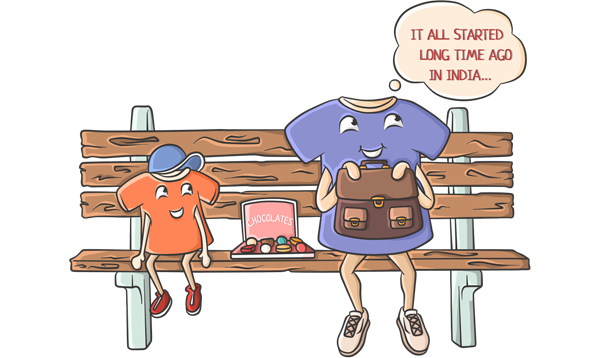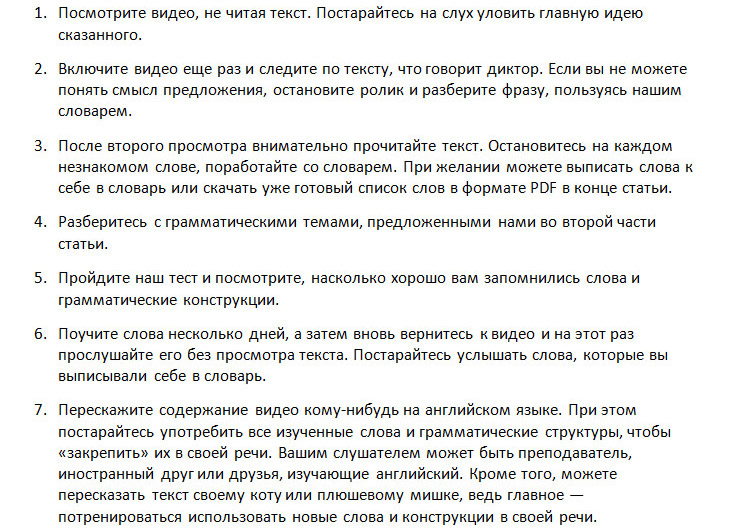От рождения до смерти одна футболка проходит через много рук, изнывает от промышленных химикатов и бесконечных стирок. Эти процессы оказывают катастрофическое воздействие на окружающую среду. Уменьшать страдания футболки и планеты или нет, каждый решает сам. Но изучить нашу лексическую подборку на тему производства одежды однозначно стоит. Ртуть, самоходная машина, пряжа, углеродный след, необработанная ткань — эти слова прямо-таки ласкают слух. Вслушайтесь сами!

Видео рассчитано на уровень Upper-Intermediate.
Перед просмотром ознакомьтесь с нашей инструкцией.

The life cycle of a t-shirt — жизненный цикл футболки
| Текст | Словосочетания |
|---|---|
| Consider the classic white t-shirt. Annually, we sell and buy two billion t-shirts globally, making it one of the most common garments in the world. But how and where is the average t-shirt made, and what's its environmental impact? | to consider — рассматривать a t-shirt — футболка annually — ежегодно globally — по всему миру common — обычный, распространенный a garment — предмет одежды average — средний environmental impact — воздействие на окружающую среду |
| Clothing items can vary a lot, but a typical t-shirt begins its life on a farm in America, China, or India where cotton seeds are sown, irrigated and grown for the fluffy bolls they produce. | a clothing item — предмет одежды to vary — различаться cotton — хлопок a seed — семя sown (прошедшая форма от to sow) — сеять to irrigate — поливать, орошать fluffy — мягкий, ворсистый a boll — семенная коробочка |
| Self-driving machines carefully harvest these puffs, an industrial cotton gin mechanically separates the fluffy bolls from the seeds, and the cotton lint is pressed into 225-kilogram bales. | a self-driving machine — самоходная машина carefully — тщательно, аккуратно, осторожно to harvest — собирать (урожай) a puff (в контексте) — комок a cotton gin — волокноотделитель to separate — отделять cotton lint — хлопок-волокно после очистки на волокноотделителе to press — прессовать a bale — брикет, кипа |
| The cotton plants require a huge quantity of water and pesticides. 2,700 liters of water are needed to produce the average t-shirt, enough to fill more than 30 bathtubs. | to require — нуждаться, требовать a quantity — количество a pesticide — пестицид (средство для борьбы с вредителями) to produce — производить enough — достаточно a bathtub — ванна |
| Meanwhile, cotton uses more insecticides and pesticides than any other crop in the world. These pollutants can be carcinogenic, harm the health of field workers, and damage surrounding ecosystems. | meanwhile — кроме того, в то же время an insecticide — инсектицид (средство для истребления насекомых) a crop — сельскохозяйственная культура a pollutant — загрязнитель окружающей среды carcinogenic — канцерогенный (вызывающий рак) surrounding — окружающий an ecosystem — экосистема, среда обитания |
| Some t-shirts are made of organic cotton grown without pesticides and insecticides, but organic cotton makes up less than 1% of the 22.7 million metric tons of cotton produced worldwide. | to make up — составлять в сумме a metric ton — метрическая тонна (= 1000 кг) worldwide — по всему миру |
| Once the cotton bales leave the farm, textile mills ship them to a spinning facility, usually in China or India, where high-tech machines blend, card, comb, pull, stretch, and, finally, twist the cotton into snowy ropes of yarn called slivers. | a textile mill — текстильная фабрика a spinning facility — прядильное производство to blend — перемешивать, смешивать to card — ворсить to comb — вычесывать to pull — вытягивать to stretch — растягивать, удлинять to twist — скручивать yarn — пряжа a sliver — прядь шерсти, ровница |
| Then, yarns are sent to the mill, where huge circular knitting machines weave them into sheets of rough grayish fabric treated with heat and chemicals until they turn soft and white. | a knitting machine — вязальная машина to weave — ткать a sheet (в контексте) — полотно, отрез rough — необработанный, грубый grayish — сероватый fabric — ткань to treat (в контексте) — обрабатывать heat (в контексте) — пар a chemical — химикат |
| Here, the fabric is dipped into commercial bleaches and azo dyes, which make up the vivid coloring in about 70% of textiles. Unfortunately, some of these contain cancer-causing cadmium, lead, chromium, and mercury. | to dip — окунать, погружать a bleach — отбеливатель an azo dye — азокраситель (синтетический краситель) vivid — яркий unfortunately — к сожалению cancer-causing — канцерогенный cadmium — кадмий (химический элемент) lead — свинец chromium — хром mercury — ртуть |
| Other harmful compounds and chemicals can cause widespread contamination when released as toxic waste water in rivers and oceans. Technologies are now so advanced in some countries that the entire process of growing and producing fabric barely touches a human hand. | a compound — соединение (химическое) widespread — широко распространенный contamination — загрязнение, заражение toxic — токсичный, ядовитый waste water — сточные воды advanced — продвинутый barely — едва |
| But only up until this point. After the finished cloth travels to factories, often in Bangladesh, China, India, or Turkey, human labor is still required to stitch them up into t-shirts, intricate work that machines just can't do. | labor — (ручной) труд to stitch up — сшивать intricate — филигранный, сложный |
| This process has its own problems. Bangladesh, for example, which has surpassed China as the world's biggest exporter of cotton t-shirts, employs 4.5 million people in the t-shirt industry, but they typically face poor conditions and low wages. | to surpass — превосходить, обгонять an exporter — экспортер to employ — нанимать, трудоустраивать a condition — условие (труда) a wage — заработная плата |
| After manufacture, all those t-shirts travel by ship, train, and truck to be sold in high-income countries, a process that gives cotton an enormous carbon footprint. Some countries produce their own clothing domestically, which cuts out this polluting stage, but generally, apparel production accounts for 10% of global carbon emissions. And it's escalating. | manufacture — производство a truck — грузовик a high-income country — страна с высоким уровнем дохода на душу населения enormous — громадный, невероятный a carbon footprint — углеродный след domestically (в контексте) — на внутреннем рынке to cut out — избегать apparel — одежда to account for — приходиться на долю a carbon emission — выброс углерода to escalate — возрастать, увеличиваться |
| Cheaper garments and the public's willingness to buy boosted global production from 1994 to 2014 by 400% to around 80 billion garments each year. | willingness — готовность to boost — увеличивать, подстегивать |
| Finally, in a consumer's home, the t-shirt goes through one of the most resource-intensive phases of its lifetime. | a consumer — потребитель resource-intensive — ресурсоемкий a lifetime — срок службы |
| In America, for instance, the average household does nearly 400 loads of laundry per year each using about 40 gallons of water. Washing machines and dryers both use energy, with dryers requiring five to six times more than washers. | for instance — к примеру a load of laundry — загрузка белья в стирку a gallon — галлон a dryer — сушильный аппарат a washer — стиральная машина |
| This dramatic shift in clothing consumption over the last 20 years, driven by large corporations and the trend of fast fashion has cost the environment, the health of farmers, and driven questionable human labor practices. It's also turned fashion into the second largest polluter in the world after oil. | a shift — сдвиг consumption — потребление driven by something — вызванный, обусловленный чем-либо fast fashion — быстрая мода (сегмент компаний, предлагающих одежду на пике моды по доступной цене и часто обновляющих ассортимент) questionable — неоднозначный, спорный oil — нефть |
| But there are things we can do. Consider shopping secondhand. Try to look for textiles made from recycled or organic fabrics. Wash clothes less and line dry to save resources. Instead of throwing them away at the end of their life, donate, recycle, or reuse them as cleaning rags. | secondhand — подержанный, бывший в употреблении recycled — переработанный to line dry — сушить на свежем воздухе instead of — вместо to throw away — выбрасывать to donate — жертвовать на благотворительность to reuse — вторично использовать a cleaning rag — тряпка для уборки, ветошь |
| And, finally, you might ask yourself, how many t-shirts and articles of clothing will you consume over your lifetime, and what will be their combined impact on the world? | an article — изделие combined — совокупный |
Грамматический клубок пассивного залога
В тексте часто встречается passive voice — пассивный (он же страдательный) залог. Чтобы распутать этот заковыристый грамматический клубок, изучим теорию.
Пассивный залог употребляется, когда действие важнее самого исполнителя. Рассмотрим пример из видео:
How and where is the average t-shirt made? — Как и где делают обычную футболку?
Кто в этом примере является исполнителем? Некие люди, занятые на производстве. Конкретные персоналии для нас не имеют значения. Важнее результат их труда — футболка. Дословно можно перевести «Как и где обычная футболка делается?».
Схема построения предложения в пассивном залоге:
| Подлежащее + to be (в нужном времени, лице и числе) + основной глагол (правильный глагол с окончанием -ed или неправильный глагол в 3-ей форме) |
Посмотрите несколько примеров из видео:
Cotton seeds are sown, irrigated and grown for the fluffy bolls they produce. — Семена хлопка сажают, поливают и выращивают, для того чтобы появились пушистые коробочки.
2,700 liters of water are needed to produce the average t-shirt. — На производство обычной футболки требуется 2 700 литров воды.
Human labor is still required to stitch them up into t-shirts. — Ручной труд все еще требуется, чтобы сшивать из них футболки.
Также ознакомьтесь с нашей статьей «Активный и пассивный залог в английском языке», после которой вопросов о страдательном залоге остаться не должно.
Мы составили для вас удобный файл, в котором вы найдете всю новую лексику из статьи. Скачайте и изучайте ее.
Скачать список лексики по теме «Видеоразбор: жизнь простой футболки» (*.pdf, 290 Кб)
Проверьте себя
Для закрепления темы мы подготовили для вас тест.